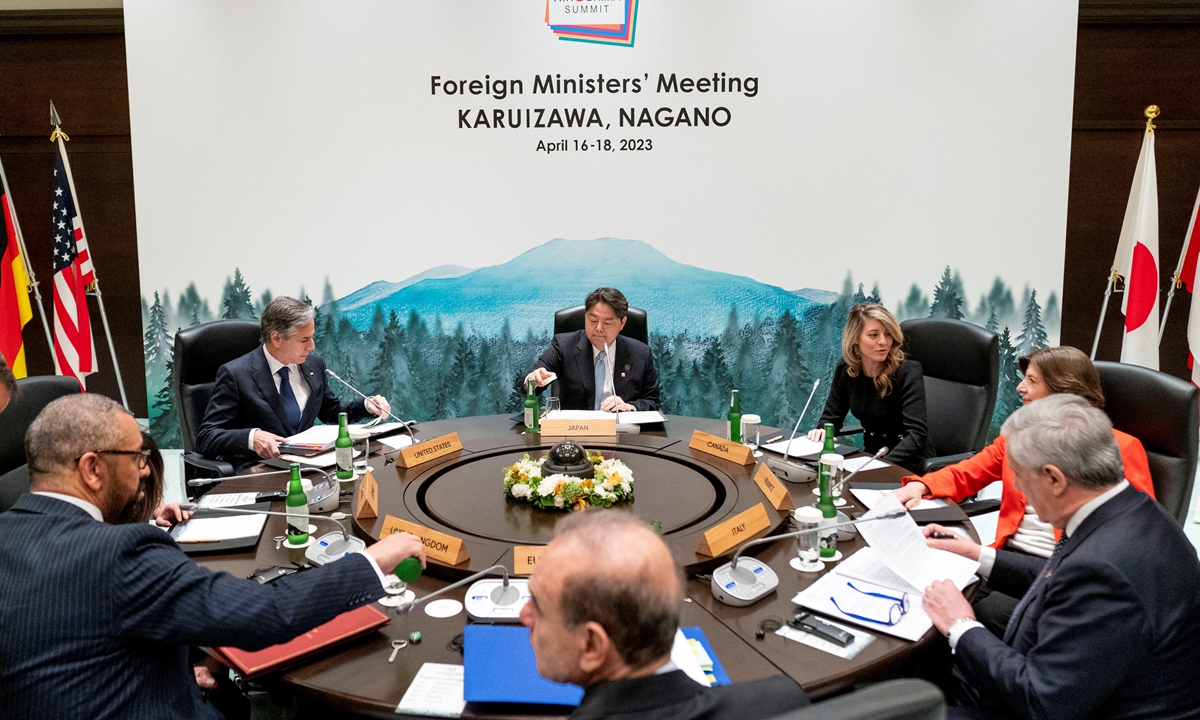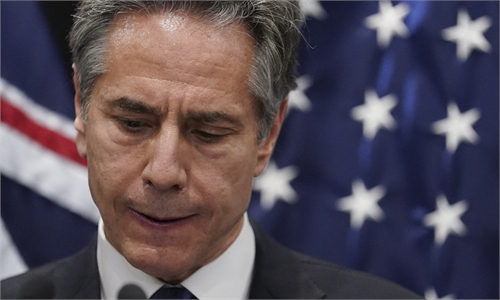Rifts in West remain as G7 seeks ‘unity’ on China under US pressure; acting as anti-China vanguard goes against Europe interests

Foreign ministers from G7 countries and Deputy Secretary General for political affairs of the European External Action Service pose for a photo at the start of the first working session of a G7 foreign ministers' meeting at the Prince Karuizawa Hotel in Karuizawa on April 17, 2023. Photo: VCG
Top diplomats from the Group of Seven (G7) have vowed to bring unity against "Chinese assertiveness" as they met in Japan for G7 foreign ministers meeting which kicked off on Sunday, while putting China's internal Taiwan question on the main agenda, along with the Ukraine crisis, Korean Peninsula-related issues, as well as engagement with the "Global South" nations.
Chinese experts viewed the G7's "Asia-Pacific shift" as the US-led bloc's new feature in Japan's home court. However, forcing Europe to tie its security concerns to the Asia-Pacific region will not make it easier for the US to mend the rifts in the West, especially against a backdrop of growing calls for strategic autonomy in Europe and the revelation that the US has been spying on allies through leaked Pentagon documents.
According to the Japan Times, the G7 ministers gathered for a second day of meetings in the mountain resort of Karuizawa on Monday after earlier highlighting the need for a "united front" in the Indo-Pacific region and for intensifying and fully enforcing sanctions on Russia.
The three-day G7 foreign ministers meeting kicked off on Sunday, and is expected to issue a joint statement on Tuesday. Japanese media said officials would call unity "extremely important", amid challenges in Asia such as rising "Chinese assertiveness" around the Taiwan question.
Despite G7 countries on Sunday agreeing to oppose any unilateral attempts to change the status quo in the Taiwan Straits by force and reaffirming the importance of peace and stability in the region, a US official said that the "G7 is split over China and the foreign ministers would be discussing how to continue a coordinated approach to China," the AP reported on Monday.
The Chinese Foreign Ministry on Monday stressed it is irresponsible to describe opposing "Taiwan independence" as changing the status quo in the Taiwan Straits.
The facts have shown that the "Taiwan independence" secessionist forces on the island, with the connivance and support of external forces, are doing whatever they can to promote secessionist activities, which is destroying the status quo in the Taiwan Straits and is the root cause of tensions there, spokesperson Wang Wenbin said.
Commenting on EU High Representative for Foreign Affairs and Security Policy Josep Borrell's remark at the start of the G7 meeting on Sunday that the relationship between China and Europe will be determined by Beijing's behavior, Wang said, "China and Europe share a wide range of common interests. Cooperation is greater than competition, consensus is greater than differences."
The EU should further uphold strategic autonomy, have a more independent and objective perception of China, and work with China based on the principles of independence, mutual respect and mutually beneficial cooperation, Wang said.
Regarding European politicians' remarks on the Taiwan question, Wang said that China hopes the EU will abide by the one-China principle, fulfill its solemn commitment of not maintaining official relations with Taiwan or concluding any agreement with Taiwan island, and truly safeguard peace and stability in the Taiwan Straits and international justice.
Asia-Pacific shift
With Japan holding the G7 rotating presidency and hosting the G7 diplomats meeting, geopolitical tensions in the Asia-Pacific are higher up on the agenda and drawing more attention. Some Japanese media outlets used the term "topping the agenda" in their headlines.
Cui Hongjian, director of the Department of European Studies at the China Institute of International Studies, told the Global Times on Monday that compared with the G7 top diplomats' meeting in 2022 putting greater emphasis on the Ukraine crisis, the ongoing G7 meeting has placed Asia-Pacific affairs, including the Taiwan question, in a more important position.
A Japanese foreign ministry official told Reuters Friday that "the security of Europe and that of the Indo-Pacific cannot be discussed separately - they are intertwined with each other."
Together with Japan, the US is seeking to bundle European security with Asia-Pacific affairs, and may introduce some new institutional arrangements, Cui said.
Despite some European politicians, especially French President Emmanuel Macron, recently saying that Europe must avoid getting dragged into a confrontation between China and the US over the Taiwan question, some analysts said there are obstacles for the EU to completely resist becoming a follower of the US.
Europe is gradually becoming involved in Asia-Pacific affairs due to their own trade and investment interests, but more importantly, in the context of the Russia-Ukraine conflict, it is being bundled into the US' "security guarantee," forcing European allies to exchange interests, such as coordinating with the US in the Asia-Pacific region, according to Cui.
Li Haidong, a professor at the China Foreign Affairs University, told the Global Times that it cannot be ruled out that the US may create some problems to make Europe feel instability in the Asia-Pacific, and thus realize the need to intervene in the region.
Citing "North Korea's missile threats," the US, along with Japan and South Korea, staged joint naval missile exercises in waters near the Korean Peninsula on Monday, Reuters reported.
On Sunday, the guided-missile destroyer USS Milius transited through the Taiwan Straits, a move that the US Navy's 7th Fleet described as a demonstration of "the US' commitment to a free and open Indo-Pacific," media reported.
Rebalance and rifts
"Unity" has been another key word during the G7 meeting in Japan. At Sunday's opening, diplomats from G7 member states agreed that maintaining unity will be "extremely important" in addressing the various challenges in the Indo-Pacific, the Kyodo News reported.
For the US, a test of solidarity could also be a test of its allies' loyalty, said Li.
Recently leaked highly classified Pentagon documents that showed how the US has been spying on friendly nations, have upset Washington's allies.
However, the US spying appeared to have resulted in less discussion and criticism in Europe than Macron's call for strategic autonomy, analysts said.
At a joint press conference with Chinese Foreign Minister Qin Gang on Friday in Beijing, German Foreign Minister Annalena Baerbock said unilateral and violent change in the status quo of the Taiwan Straits would not be acceptable for Europe.
"Anything that happens in the Taiwan Straits will mean a lot to us," Borrell said on Sunday, stressing the need to engage with China and keep communications open, according to Reuters report.
"Europe is seeking a kind of internal rebalancing in its rhetoric toward China, balancing Macron's impact," Cui said, "This may be reflected in the G7 joint statement, such as expressing concern over the Taiwan question, expressing opposition to a change in the status quo by force, and so on."
Analysts said the Europeans were also speaking to the Americans about the issue.
Europe hopes that the status quo in the Taiwan Straits will not change, but the US has been changing the status quo and trying to drag Europe into becoming a vanguard that confronts China, which goes against the overall interests of European countries that enjoy deep mutually beneficial economic ties with the world's second largest economy, Li said.
Due to their own interests, a rift has emerged between Europe and the US when it comes to the Taiwan question, Li noted.
"Even so, we must remind Europe that with the US doing so much to change the status quo on the Taiwan Straits, has Europe also openly expressed concerns to the US?"
A Europe that seeks strategic autonomy should have an independent and balanced objective voice on the world stage, instead of following the US, Li remarked, noting that more should be done by Europe to prevent the US from changing the status quo on the Taiwan Straits, so as to better ensure Europe's strategic autonomy.


